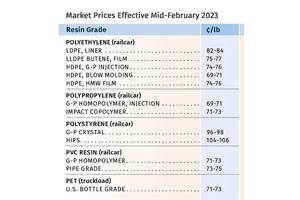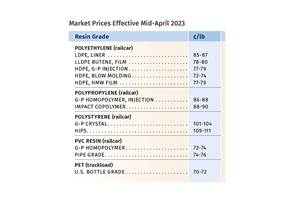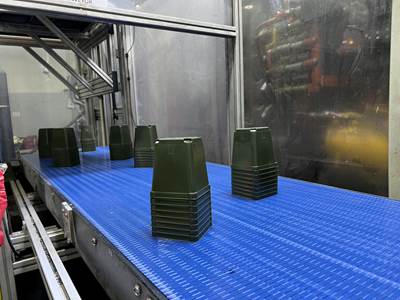Commodity Resin Prices Still Dropping - January 2015
Led by lower global feedstock and resin prices, commodity resin prices continue to decline.
Prices of the four main commodity resins dropped further in December and were all expected to decline by nearly equal amounts last month. Leading the pack was PP, with double-digit price reductions, although PS price decreases appeared to be next in magnitude. Yet PVC suppliers are aiming for an increase this month, though its outcome looks dim. These are the views of purchasing consultants at Resin Technology, Inc. (RTi), Fort Worth, Texas, CEO Michael Greenberg of The Plastics Exchange, Chicago, and global industry experts at IHS Chemical, Houston.
PE PRICES LOWER & LOWER
Polyethylene contract prices dropped by a total of 7¢/lb by the end of 2014, with decreases of an additional 7-10¢ possible in this first quarter. Mike Burns, v.p. of PE at RTi, ventured that a price decrease on the order of 3-5¢/lb was possible last month. Greenberg noted that Equistar had announced a decrease of 4¢, but he speculated that a higher amount was possible by January’s end.
Spot PE prices by year’s end were at least 10-15¢/lb lower than prime resin prices, the largest delta since 2008-2009. Greenberg noted that spot prices, depending on the grade, range from the low 50s to mid-70s ¢/lb range. Meanwhile, supplier inventories grew to the highest level in years, according to Burns. While crude oil remains under $65-70/bbl, he says, no PE resin price hikes are likely to emerge. Burns notes that the North American cost to produce PE pellets from ethane (natural gas) is now below 25¢/lb.
Nick Vafiadis, senior director of global polyolefins and plastics at IHS Chemical, said domestic PE prices will have to come down more this year to meet China’s prices.
PP PRICES PLUNGE
In December, polypropylene prices fell 10¢/lb in step with propylene monomer, following a 5¢/lb drop in November. Resin prices were expected to sink even lower in January and this month, according to Scott Newell, RTi’s director of client services for PP.
Newell noted that monomer contract price nominations for January were likely to sink at least 8¢/lb lower and perhaps even 10-12¢/lb. He added that PP resin prices would follow, but 2¢/lb higher, as PP suppliers aim to implement their fourth-quarter margin expansion plan. Greenberg noted that PP supply is still relatively snug and spot prices have varied from the mid-60s to nearly 80¢/lb for buyers in a hurry. He said patient buyers can get material at the lower price level.
Meanwhile, Newell said monomer supply is in good shape. He added that with lower global feedstock prices, there are now some propylene monomer imports from Asia coming into the Americas.
PP resin demand appears to be relatively good, with some pretty strong restocking likely to be taking place through the first quarter. Newell cautions that until new on-purpose propylene monomer units come on stream in the second half, and until domestic PP prices (still the highest globally) come down further, imports of both PP resin and finished goods are a threat.
PS PRICES TUMBLE
Polystyrene prices dropped a total of 7¢/lb in the last two months of 2014, and at least one supplier had announced a decrease of 9¢/lb for January.
Mark Kallman, RTi’s v.p. of client services for engineering resins, PS, and PVC, noted that the announced decrease was driven by the precipitous drop in January benzene contracts of $1.17/gal. December ethylene contracts settled 7.25¢/lb lower, and January contracts were expected to drop some more, owing to improved monomer supplies. Styrene monomer exports have slowed significantly due to lower monomer prices abroad, resulting in ample domestic monomer supplies.
Meanwhile, demand is sluggish because of seasonally slow markets, but also because processors are holding back on buying, waiting for prices to bottom out.
PVC PRICES DROP
PVC prices dropped 3¢/lb in December following a 2¢ decrease in November, and
further decline was expected last month due to the 7.5¢/lb drop in December ethylene contracts, with more softening anticipated.
In the teeth of all this, PVC suppliers announced an increase of 3¢/lb for Feb. 1. The chances of such a move succeeding appear to be slim. Demand has slowed as buyers anticipate lower prices. Says RTi’s Kallman, “This increase’s implementation faces a lot of obstacles. Feedstock prices are down, there is the seasonal demand slowdown, and PVC exports are down due to lower global PVC prices.” PVC suppliers, who reportedly throttled back production significantly before the end of 2014, cite three planned plant maintenance shutdowns in this year’s first quarter as support for their price initiative.
Related Content
First Quarter Looks Mostly Flat for Resin Prices
Temporary upward blips don't indicate any sustained movement in the near term.
Read MoreCommodity Resin Prices Flat to Lower
Major price correction looms for PP, and lower prices are projected for PE, PS, PVC and PET.
Read MorePP Prices May Plunge, Others Are Mostly Flat
PP prices appear on the verge a major downward trajectory, with some potential of a modest downward path for others.
Read MoreBaxter to Scale Up PVC Intravenous Bag Recycling Program
Successful pilot program with Northwestern Medicine will expand to additional units and health systems.
Read MoreRead Next
Processor Turns to AI to Help Keep Machines Humming
At captive processor McConkey, a new generation of artificial intelligence models, highlighted by ChatGPT, is helping it wade through the shortage of skilled labor and keep its production lines churning out good parts.
Read MoreLead the Conversation, Change the Conversation
Coverage of single-use plastics can be both misleading and demoralizing. Here are 10 tips for changing the perception of the plastics industry at your company and in your community.
Read MoreAdvanced Recycling: Beyond Pyrolysis
Consumer-product brand owners increasingly see advanced chemical recycling as a necessary complement to mechanical recycling if they are to meet ambitious goals for a circular economy in the next decade. Dozens of technology providers are developing new technologies to overcome the limitations of existing pyrolysis methods and to commercialize various alternative approaches to chemical recycling of plastics.
Read More

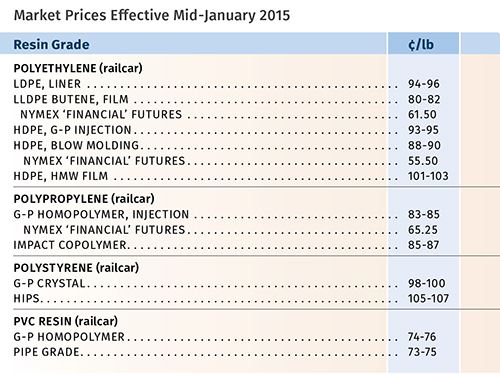
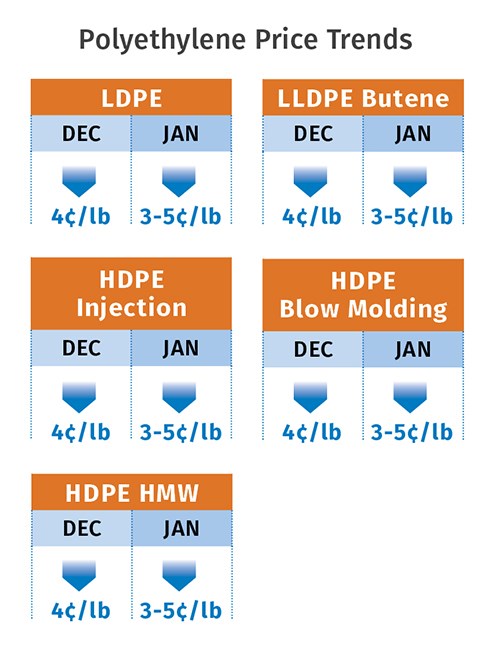
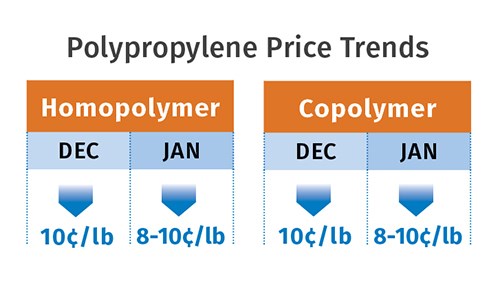
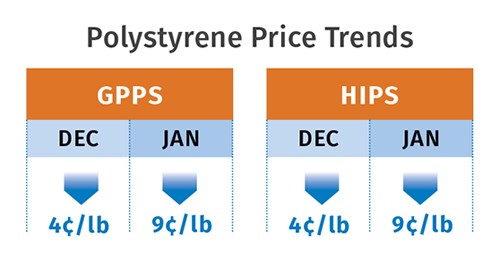
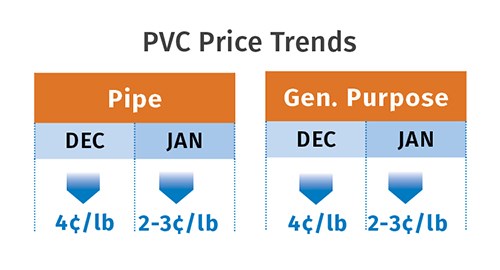






.png;maxWidth=300;quality=90)











